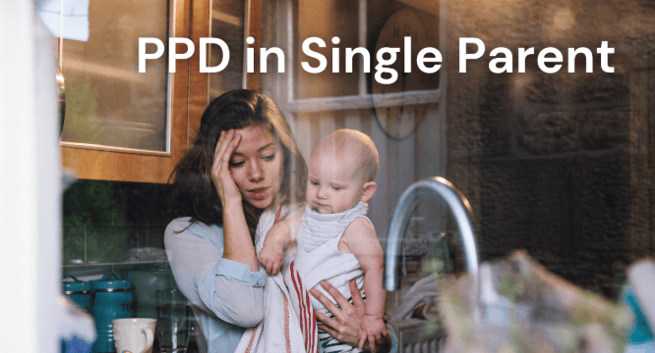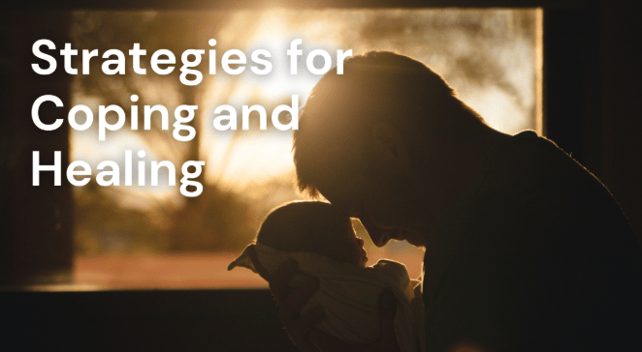Navigating PPD as a Single Parent: Finding Stability in the Storm
7/1/20254 min read
Postpartum depression (PPD) is an overwhelming and isolating experience for any parent - but when you’re navigating it as a single parent, the weight can feel exponentially heavier. Without a live-in partner to share the mental, physical, and emotional load, daily survival can become a daunting challenge. Tasks that might seem small to others - making a bottle, getting to a doctor’s appointment, or taking a shower can feel like monumental hurdles when you’re also battling exhaustion, self-doubt, and despair.
Yet, despite the unique burdens they carry, single parents with PPD are often overlooked in discussions about postpartum mental health. The truth is, their stories matter deeply, and they deserve support, not stigma.
At Peace Temple, we regularly work with single mothers and fathers navigating postpartum depression alone. While their struggles are real, so is their resilience. This article explores the challenges of PPD as a single parent and the strategies and support systems that can help you move from surviving to healing.


Why Single Parents Are at Higher Risk for PPD
Research consistently shows that single parents are at a greater risk for developing postpartum depression. This isn’t a reflection of weakness, it’s a reflection of increased vulnerability due to reduced support and higher stress loads.
Some contributing factors include:
Financial stress and lack of childcare options
Limited emotional support during pregnancy and postpartum
Isolation from family or community
Unresolved trauma or lack of a birth partner
Exhaustion from managing everything alone
It’s important to remember: none of these are personal failures. They are circumstantial pressures, and acknowledging them is the first step toward addressing them.
The Emotional Landscape of Single Parenthood with PPD
PPD already challenges one’s sense of identity, capability, and self-worth. As a single parent, these struggles can feel even more intense—and often come with layers of guilt, comparison, and fear.
1. Guilt and Shame
Many single parents carry guilt over their family structure, fearing they’ve let their child down. When depression interferes with parenting—like feeling detached or irritable - that guilt compounds. Thoughts like “My child deserves better” or “I should be stronger than this” are common, but dangerous.
At Peace Temple, we help parents reframe these narratives: your strength isn’t in doing everything perfectly - it’s in continuing to show up, even when it’s hard.
2. Isolation
Without a partner to talk to at 2 a.m. or share morning routines, loneliness can feel crushing. Single parents may go days without adult conversation, amplifying the disconnection and hopelessness that PPD brings.
3. Hyper-responsibility
Single parents often feel that everything depends on them. There’s no backup, no one to “take over” for a while. This unrelenting pressure fuels anxiety and makes rest feel like a luxury rather than a necessity.
Signs of PPD in Single Parents
The signs of postpartum depression are the same regardless of family structure, but in single parents, they may go unnoticed or dismissed as "expected stress." Be aware of:
Persistent sadness or tearfulness
Irritability or anger
Trouble bonding with your baby
Changes in appetite or sleep
Feeling numb or disconnected from life
Intrusive thoughts or fears about harm
Thoughts of being better off gone or that your baby would be
If you're experiencing any of these symptoms for more than two weeks, you are not alone and you deserve care. Peace Temple’s maternal mental health professionals offer individualized, stigma-free support for single parents struggling with PPD.


Strategies for Coping and Healing
You may be doing this alone, but you don’t have to heal alone. These strategies can help bring structure, relief, and hope to your journey.
1. Build a Support Network - Even If It’s Patchwork
Support doesn’t have to come from one perfect person. It can be a collection of allies:
A neighbour who watches the baby for 30 minutes
A local moms’ group or online forum
A friend who brings groceries or checks in
A therapist or counsellor
Virtual support groups, like those at Peace Temple
Let go of the idea that you have to manage silently. Ask for help, even in small doses.
2. Create Systems That Work for You
When you’re the sole caregiver, burnout is a real risk. Simplify where possible:
Set up baby routines that reduce decision fatigue
Prep meals in batches or use delivery services
Schedule a daily “quiet time” for both you and your baby
Use tech—timers, reminders, soothing playlists—to structure your day
Efficiency isn’t about productivity, it’s about preserving your energy.
3. Practice Self-Kindness
You’re not just parenting, you’re recovering. And healing requires compassion. Some days, just keeping the baby fed and safe is enough.
Affirmations to repeat:
“I am doing the best I can with what I have.”
“My child needs a present parent, not a perfect one.”
“Needing help doesn’t mean I’ve failed.”
4. Seek Professional Help Without Shame
Therapy is not a luxury, it’s an act of survival and self-preservation. Whether it’s counselling, support groups, or medication, your mental health is a priority, not an afterthought.
Peace Temple offers virtual and in-person therapy designed for single parents, with flexible scheduling and practical, no-judgment support.
5. Connect With Other Single Parents
Being surrounded by married or partnered parents can increase feelings of difference or inadequacy. Seek out communities where your experience is reflected and respected. These connections reduce shame, normalize your feelings, and offer real-life strategies from others walking the same path.
What to Say to Yourself on Hard Days
PPD lies to you. It tells you you’re not enough, that you’re alone, that you’ll never feel better. On the hardest days, it helps to have mantras that anchor you:
“This is hard, but I’ve done hard things before.”
“I can ask for help, even if it feels uncomfortable.”
“My baby needs me, not some idealized version of a parent.”
“It’s okay if today looks like survival.”
And if all else fails: “This will not last forever.”
Final Thoughts: You Are Not Alone—Even If It Feels Like It
Single parenting during postpartum depression is a uniquely intense experience. It demands more energy, more patience, and more resilience than most people can imagine. But it also offers something powerful: the reminder that healing is possible even in the most challenging circumstances.
At Peace Temple, we are committed to walking with you through this. You don’t have to carry everything, every day. You are allowed to rest. You are allowed to receive. And you are absolutely allowed to heal.
You are not failing. You are navigating something difficult and doing it with strength, even on the days when it doesn't feel like it.
